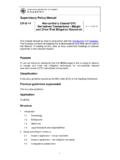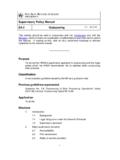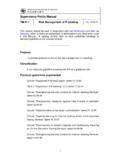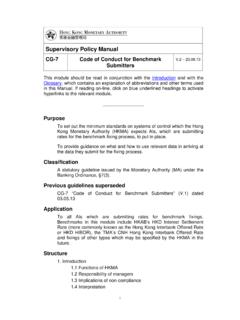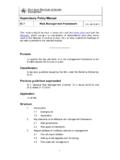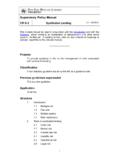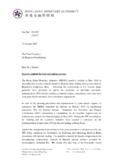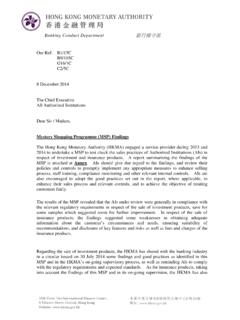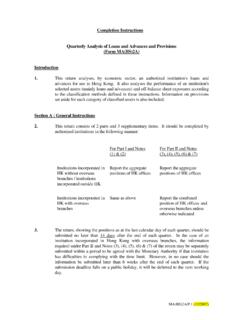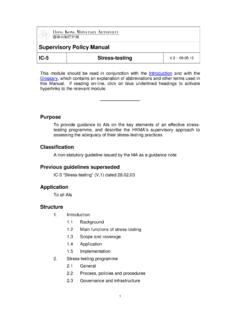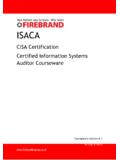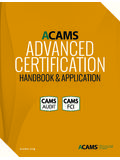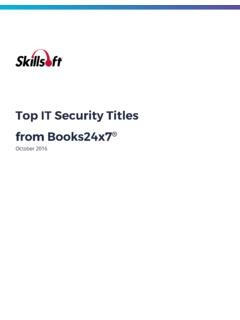Transcription of Our Ref.: B9/166C 19 December 2016 Dear Sir/Madam,
1 Our Ref.: B9/166C 19 December 2016 The Chief Executive All Authorized Institutions Dear Sir/Madam, Enhanced Competency Framework on Cybersecurity I am writing to introduce the launch of the Enhanced Competency Framework (ECF) on Cybersecurity. Authorized institutions (AIs) have increased their reliance on technologies and online channels to deliver innovative banking services to their customers. The level of cyber resilience, which contributes to the operational resilience, is becoming a decisive factor in the overall resilience of the systems and operating environment of AIs. Given the growing number of cyber attacks to financial institutions in recent years, it is essential to improve AIs preparedness and capability to defend for such attacks. In this connection, the Hong Kong Monetary Authority (HKMA) and the banking industry have worked together to develop an industry-wide ECF on Cybersecurity for the banking sector.
2 This framework enables cybersecurity talent development and facilitates the building of professional competencies and capabilities of those staff engaged in cybersecurity duties. In addition, the Guide to ECF on Cybersecurity is attached to this letter. The Guide aims to provide details of the scope of application, qualification structure, recognised certificates and continuing professional development requirements to equip relevant staff with the right skills, knowledge and behaviour. As the Supervisory Policy Manual module CG-6 Competence and Ethnical Behaviour has already emphasised the importance of ensuring continuing competence of AIs staff members, AIs are therefore encouraged to make use of the ECF on Cybersecurity to raise and maintain professional competence of their cybersecurity practitioners. - 2 - Separately, AIs are advised to keep records of the relevant training and qualifications.
3 The HKMA will assess the progress of implementation of the ECF on Cybersecurity by AIs and AIs effort in enhancing staff competence in this area during its on-going supervisory process. In the meantime, if you have any enquiries relating to this circular, please contact Mr Josiah Lam on 2878 1425 or Mr Wilson Pang on 2878 1249. Yours faithfully, Arthur Yuen Deputy Chief Executive Encl. FSTB (Attn: Ms Eureka Cheung) Guide to Enhanced Competency Framework on Cybersecurity Hong Kong Monetary Authority December 2016 1 Table of Contents 1. Introduction .. 2 2. Objectives .. 3 3. Scope of application .. 4 4. Qualification structure .. 5 5. Recognised 6 6. Training programmes and examinations .. 7 7. Continuing Professional Development (CPD) requirements .. 7 8. Grandfathering .. 7 9. Maintenance of relevant records .. 8 Annex 1 Example of key tasks for roles under ECF-C .. 9 Annex 2 Key roles, qualifications and CPD requirements under ECF C Competency Framework.
4 13 Annex 3 - Routes to certification .. 15 2 1. Introduction Cybersecurity has become more important to the banking sector. According to research, in 2015, the global average annualised cost of cybercrimes amounted to HK$ million (equivalent to US$ million) per The same research shows that the financial sector is experiencing the highest average annualised cost as compared with other industry segments in 2015. As internet and digital banking services have become more common, the modern bank is now under an unprecedented spectrum of attacks which are copious in numbers and sophisticated in complexity. To build the required resilience against these cyber threats, there is a need for banks to formulate new and dynamic system designs that will provide a rapid response to such attacks. In Hong Kong, the cyber security landscape has changed drastically over the last decade. Cyber threats in Hong Kong continue to rise in numbers: in 2015, the Hong Kong Computer Emergency Response Team Coordination Centre ( HKCERT ) handled almost 5,000 cyber-attack incidents, representing a 43% increase in cyber-attacks year on According to police statistics, financial losses due to cybercrime cases amounted to HK$ billion in Hong Kong during 1 Ponemon Institute LLC (sponsored by Hewlett Packard Enterprise).
5 "2015 Cost of Cyber Crime Study: Global". Publication date: October 2015. Retrieved on 27 July 2016 from 2 Hong Kong Computer Emergency Response Team Coordination Centre (HKCERT). "HKPC Warns of Growing Cyber Attacks that Harvest Credentials for Profit". HKCERT Press Centre. Publication date: 27 January 2016. Retrieved on 22 July, 2016 from 3 Questex Asia Ltd. "Cyber Security Summit launches at Science Park". Computer World Hong Kong Publication date: 17 May 2016; SCMP. "Hackers have their sights on Hong Kong, cyber security experts warn". Publication date: 14 May 2016. Retrieved on 27 July 2016 from ve -their-sights-hong-kong-cyber-security-e xperts 3 With respect to the banking sector in Hong Kong, the city is one of the most popular targets for banking malware The Hong Kong Institute of Bankers ( HKIB ) is quoted as stating that the banking sector is 300% more likely to face cyber-attacks than any other sector.
6 5 In light of the heightened cyber risk in the banking sector, the Hong Kong banking industry recognises the vital importance of protecting banks and its customers from cyber-attacks, and in upholding Hong Kong's position as a leading international financial centre. Against this backdrop, the Hong Kong Monetary Authority ( HKMA ) has considered the necessity of placing cybersecurity at the forefront of its fintech agenda. In May 2016, the HKMA announced the Cybersecurity Fortification Initiative ( CFI ) with the purpose of enhancing the resilience of Hong Kong banks to cyber-attacks under a three-pronged approach. CFI includes introducing a common risk-based assessment framework for Hong Kong banks, a professional training and certification programme that aims to increase the supply of qualified professionals, and a cyber-intelligence sharing platform. In parallel with the CFI's professional training and development programme, the HKMA is now launching a module on cybersecurity under the Enhanced Competency Framework (ECF) for banking practitioners.
7 The goal is to introduce an industry-wide competency framework for the banking sector that enables talent development, and facilitates the building of professional competencies and capabilities of those working in cybersecurity. In view of the evolving cybersecurity risks, it is imperative that banks should start enhancing their cybersecurity cultures by equipping staff with the right skills, the right knowledge and the right behaviour. 2. Objectives The ECF on Cybersecurity (hereinafter referred to as ECF-C ) is a non-statutory framework which sets out the common core competences required of 4 Kaspersky Lab. "Kaspersky Security Bulletin 2015", Retrieved on 22 July 2016 from 5 SCMP. "On the defence: Hong Kong Monetary Authority to boost cybersecurity for city's banking system". Publication date: 18 May 2016. Retrieve on 27 July 2016 from 4 cybersecurity practitioners in the Hong Kong banking industry.
8 The objectives of the ECF-C are twofold: (a) to develop a sustainable talent pool of cybersecurity practitioners for the workforce demand in this sector; and (b) to raise and maintain the professional competence of cybersecurity practitioners in the banking industry. Although the ECF-C is not a mandatory licensing regime, authorised institutions ( AIs ) are encouraged to adopt the ECF-C. This includes: (a) to serve as a benchmark to determine the level of competence required and to assess the ongoing competence of individual employees; (b) to support relevant employees to attend training programmes and examinations that meet the ECF-C benchmark; (c) to support the continuing professional development of individual employees; and (d) to specify the ECF-C as one of the criteria for recruitment purposes. 3. Scope of application The ECF-C is aimed at persons (referred as Relevant Practitioners ) engaged by AIs undertaking cybersecurity roles.
9 Under the ECF-C, a Relevant Practitioner is defined as: a new entrant or an existing practitioner engaged by an authorised institution to perform in roles ensuring operational cyber resilience . For avoidance of doubt, the following categories of staff are excluded from the definition of Relevant Practitioners : (a) Those who are not required to perform the three key roles specified 5 under the ECF-C ( IT Security Operations and Delivery, IT Risk Management and Control, and IT Audit); and (b) Those who performing key roles solely in the information technology operating function of an AI, such as system developers, system operators, helpdesk operators, and IT support. AIs have the responsibility to ensure Relevant Practitioners performing duties in overseas branches and subsidiaries should be competent and have the capability as required under the ECF-C. However, we understand that the qualifications held by the staff outside Hong Kong may be different from the required qualifications set out in ECF-C.
10 To allow flexibility to implement the ECF-C, AIs may exercise sound judgment on evaluating if those staff in overseas branches and subsidiaries possess equivalent qualifications that are: (a) formally recognised by the list of certificates under ECF-C (see Section ); and/or (b) similar to the list of certificates under the ECF-C (see Section ), in which the similarity criterion should be determined based on the following three factors: i. recognition of the qualification by the local industry; ii. technical qualification of the certificates; and iii. ethical requirement of the qualification. 4. Qualification structure The qualification structure of the ECF-C comprises the following two levels based on the year of work experience of Relevant Practitioners in performing the tasks as specified in Annex 1: (a) Core Level - This level is applicable for entry-level staff with less than 5 years of relevant work experience in the cybersecurity function.
